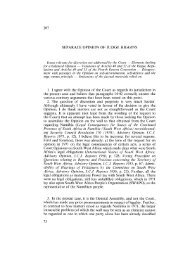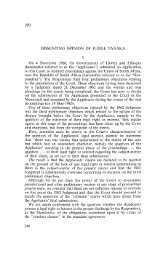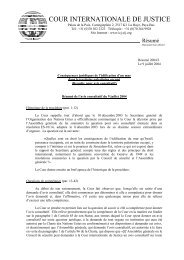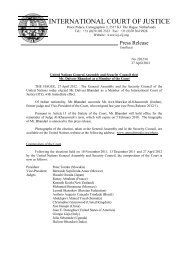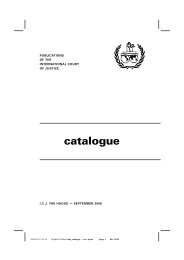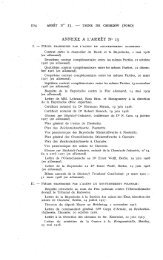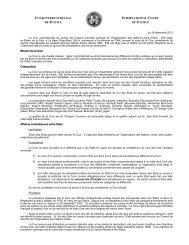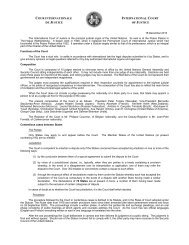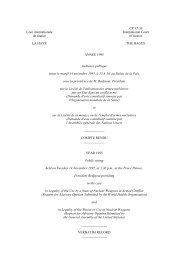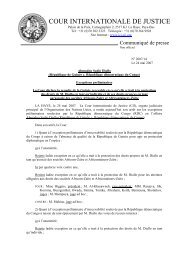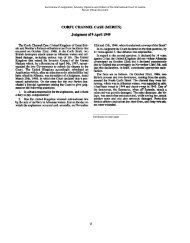botswana/namibia - Cour international de Justice
botswana/namibia - Cour international de Justice
botswana/namibia - Cour international de Justice
You also want an ePaper? Increase the reach of your titles
YUMPU automatically turns print PDFs into web optimized ePapers that Google loves.
(iii) The Alleged Authority of the Eastern Caprivi Chiefs<br />
682. The Namibian Memorial offers an argument consisting of the following combination of<br />
elements:<br />
(i) The appearance of German administration in the Eastern Caprivi (a process beginning in<br />
1909).<br />
(ii) By virtue of the system of indirect rule, chiefs were elected only with the agreement of the<br />
German administration and were therefore essentially agents of the German administration.<br />
(iii) The chiefs had authority (this is an unargued assumption) to engage in title-generating<br />
activities on behalf of the German State, even if this involved the risk of modifying recently<br />
conclu<strong>de</strong>d boundary treaties.<br />
(iv) The chief in Kasika carried out such title-generating activities in Kasikili/Sedudu Island<br />
either directly or through the agricultural activities of his subjects.<br />
683. These elements call for analysis. Each element will be examined in turn.<br />
684. First element. The appearance of German administration in the Eastern Caprivi is<br />
<strong>de</strong>scribed in the Namibian Memorial and the <strong>de</strong>scription is embellished with a photograph of<br />
the installation of Chikamatondo as chief of the Masubia (Namibian Memorial, pp.88-93).<br />
Not one line, not a single word, relates to Kasikili/Sedudu Island. The entire section consists<br />
of prevarication.<br />
685. Second and third elements. The reference to the British policy of indirect rule is totally<br />
inconclusive. It is suggested by inference that the German policy in South-West-Africa was<br />
mo<strong>de</strong>lled on British policy in Nigeria (Namibian Memorial, p.89, para. 224). No single piece<br />
of evi<strong>de</strong>nce supports the inference. The Government of Botswana is willing to accept that,<br />
both in German-controlled territory and in Bechuanaland Protectorate, the authority of the<br />
traditional chiefs was subjected to a process of colonial approval. The chiefs thus became in a<br />
certain sense agents of the colonial administration on both si<strong>de</strong>s of the River Chobe. But there<br />
is no evi<strong>de</strong>nce, and no evi<strong>de</strong>nce is offered, to the effect that the chiefs had authority to engage<br />
in title-generating activities. Both legally and historically this would be eccentric. No<br />
instances of such authority are known of anywhere in colonial Africa. The Namibian<br />
Memorial provi<strong>de</strong>s the inference, but gives no evi<strong>de</strong>nce in respect of the situation in the<br />
Eastern Caprivi (and no other examples). It is an astonishing proposition that the chiefs could<br />
engage in activities which would subvert the results of recent and prolonged negotiations<br />
between London and Berlin.<br />
686. Fourth element. As it has been pointed out above, there is no evi<strong>de</strong>nce that the Eastern<br />
Caprivi chiefs had authority to engage in title-generating activities. It must follow that any<br />
activities which were in fact carried out on the island could not create title in favour of<br />
Germany or its successors. The evi<strong>de</strong>nce relating to the alleged activities and presence of<br />
people from the village of Kasika (in the Eastern Caprivi) on the island has been examined in<br />
Chapter 7 above. For present purposes it must be emphasized that the use of the island for<br />
ploughing did not connote possession as a matter of title on the basis of <strong>international</strong> law. To<br />
this day, Basubia from Botswana own fields in the Eastern Caprivi. Ownership or use of land<br />
for private or chiefly purposes has at no stage involved a change of sovereignty.



